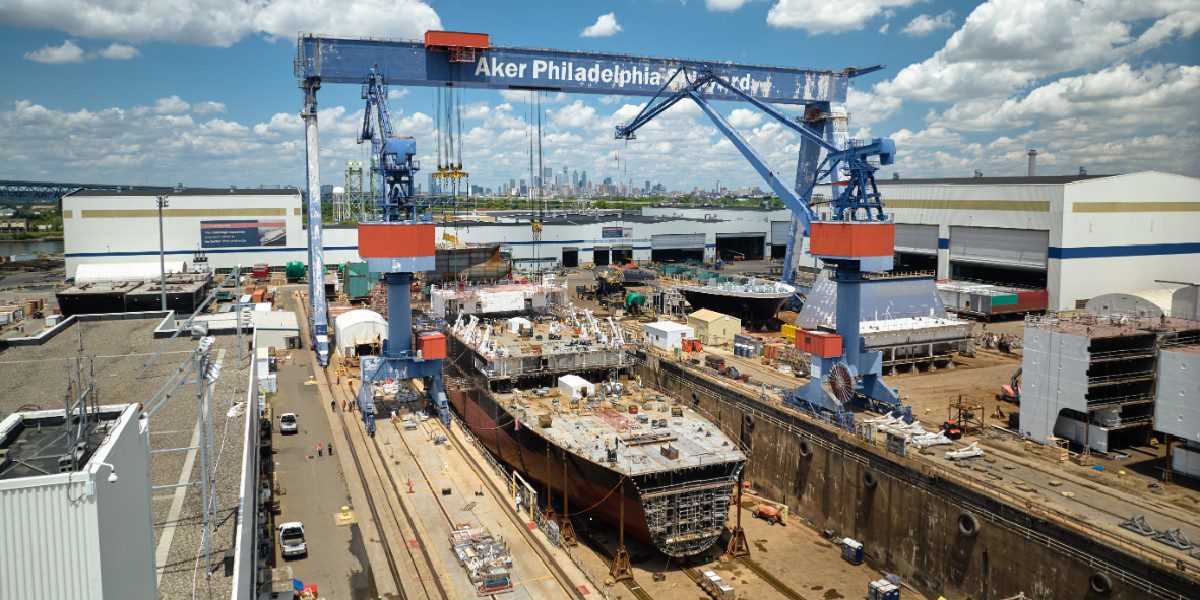The United Steelworkers Union (USW) has spearheaded a group of labor organizations to file a Section 301 petition urging the U.S. Trade Representative (USTR) to launch an inquiry into China’s anti-competitive commercial shipbuilding practices.
Over the past twenty years, the People’s Republic of China (PRC) has strategically aimed to control global transportation and logistics networks by implementing various non-market policies designed to dominate global shipbuilding and choke out the competition. All the while, the capacity for shipbuilding in the United States has continued to decline.
“Once home to nearly 30 major shipyards, the United States now has only a fraction of that,” stated USW International President David McCall. He highlighted the correlation between the reduction in shipyards and the loss of over 70,000 shipbuilding jobs, not to mention the secondary jobs that the industry supports.
According to McCall, a commercial ship can require about 13,000 tons of structural steel, 60,000 gallons of paint, 130 miles of electrical cable, and many other products that tens of thousands of USW members take pride in producing.
“The PRC is using commercial shipbuilding to dominate the full spectrum of global trade, choking out all competitors,” McCall said. “If we do not act quickly, we will soon be dependent on China not only for the products their vessels bring into our ports but also for the ships themselves.”
Through numerous state-directed industrial campaigns, China has directed hundreds of billions of dollars in subsidies to state-owned enterprises in a strategic policy effort to dominate global commercial shipbuilding, according to a Center for Strategic and International Studies analysis.
Beyond the economic implications, McCall also pointed out that the growing imbalance in shipbuilding poses a national security threat. “China now operates the world’s largest navy, overtaking the United States,” he said, emphasizing the need to rebuild the Merchant Marine for enhancing national sealift capability and bolstering the supply chains of military and commercial shipbuilding industries.
Section 301 of the Trade Act of 1974 empowers the President to retaliate against any foreign government’s actions that violate international trade agreements or unfairly burden or restrict U.S. commerce. Upon receiving a Section 301 petition, the USTR will investigate the alleged unfair trade practices and can take action if the practices are found to be unjustifiable, unreasonable, or discriminatory.
Along with USW, several other unions, including the International Association of Machinists and Aerospace Workers, the International Brotherhood of Boilermakers, the International Brotherhood of Electrical Workers, and the Maritime Trades Department, AFL-CIO, have joined in the trade petition.
Both U.S. Senators Tammy Baldwin and Bob Casey have also written to the Biden administration in support of the trade petition, representing a growing group of policymakers working to revive the shipbuilding industry.
McCall praised the collaboration between labor unions and the Biden administration in establishing a worker-centered trade policy and enhancing domestic manufacturing capacity. “Reviving the commercial shipbuilding industry will enable America to expand those investments, ensure a steady supply of goods at home, and grow the middle class,” he stated.
The petition comes after President Biden recently announced a $20 billion investment to bolster domestic crane manufacturing in the U.S. to counter China’s market-leading production of critical port infrastructure used in ports around the world, including in the U.S. The ship-to-shore (STS) cranes have been scrutinized for posing a potential cyber security risk.
The petition is also supported by the The Shipbuilders Council of America (SCA), the national trade association representing the U.S. shipbuilding, maintenance, and repair industry.
“The SCA applauds this effort to place a spotlight on what has been a thoroughly state orchestrated
industrial campaign by China to drive out global competition in shipbuilding and ship repair with the goal of controlling international shipping and the crippling of manufacturing businesses around the world, particularly in the U.S.,” said SCA President, Matthew Paxton.
USTR Katherine Tai now has 45 days to decide whether to pursue an investigation into Chinese shipbuilding.

 Join The Club
Join The Club










